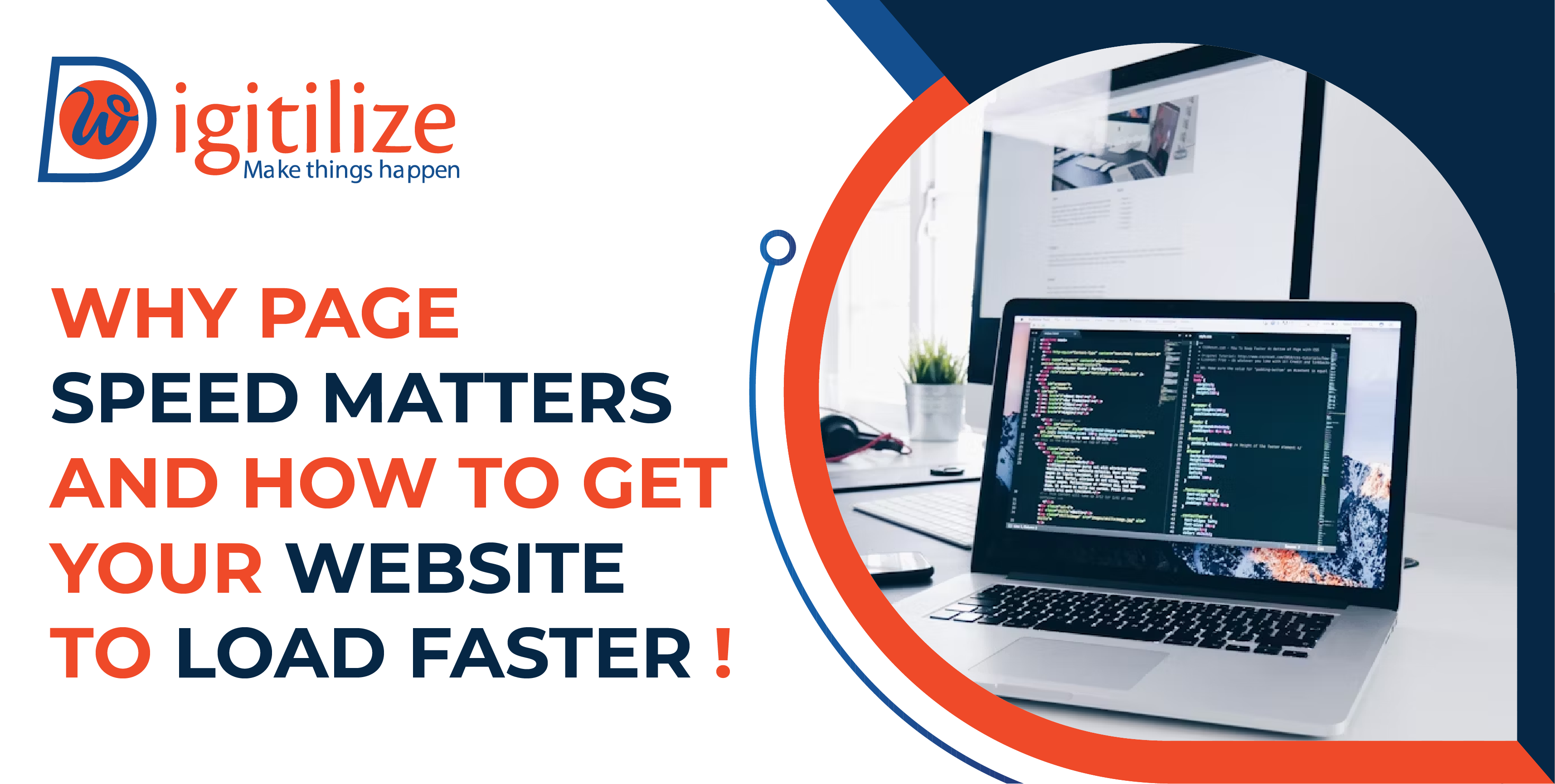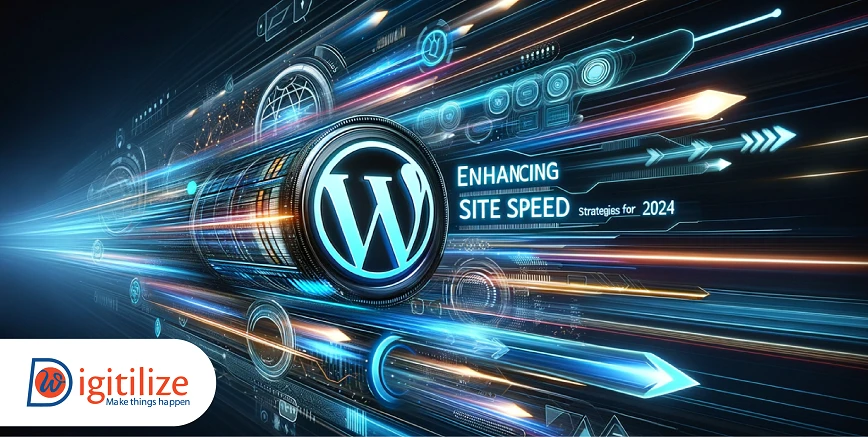Why Page Speed Matters and How to Get Your Website to Load Faster!
 Google has made page speed a key ranking criterion, which means that it determines an internet business’s success. You must take website performance optimisation measures to maintain your company’s leadership. Poor website performance affects any online business severely. So, it is important to know why page speed matters and how to get your website to lead faster.
According to statistics, 53% of mobile site visits are abandoned if pages take longer than three seconds to load, leading us to believe that impatience is the most prevalent characteristic of modern online user behaviour. It’s not difficult to increase page speed, which is fantastic news. In this post, we’ll discuss the significance of a website’s loading speed as well as technical implementations, tools, and advice for a quicker website, more visitors, and better search engine rankings.
Google has made page speed a key ranking criterion, which means that it determines an internet business’s success. You must take website performance optimisation measures to maintain your company’s leadership. Poor website performance affects any online business severely. So, it is important to know why page speed matters and how to get your website to lead faster.
According to statistics, 53% of mobile site visits are abandoned if pages take longer than three seconds to load, leading us to believe that impatience is the most prevalent characteristic of modern online user behaviour. It’s not difficult to increase page speed, which is fantastic news. In this post, we’ll discuss the significance of a website’s loading speed as well as technical implementations, tools, and advice for a quicker website, more visitors, and better search engine rankings.
What’s the meaning of page speed?
The term “page speed” describes how quickly a specific page loads from the website hosting servers and appears in the web browser that is requesting it. The amount of time that passes between clicking on a link and the requesting browser displaying the whole content of the website is known as the page load time. If it takes a while for your website to load, there may be a server issue. Apart from the fact that customers detest slow-loading websites, poor page speed will result in Google penalising your website. If it takes more than 0.4 seconds for a website to load, it is slow. The ideal page load speed, according to Microsoft experts and computer scientist Harry Shum, is 0.25 seconds. The term “website speed” or “website performance” describes how quickly a browser loads a website’s fully functional web pages. Users may become disinterested in websites with poor performance or slow browser rendering. On the other hand, websites with faster loading times tend to attract more visitors and have higher conversion rates.Importance of page speed for SEO

-
Conversion rate
-
Sales
-
User Interaction
-
Utilisation
-
Income
Ways to Increase Page Speed Increase Website Loading Speed with SEO
 One of the normal operating processes you need to follow to rank your site on Google’s first page is to increase site speed. It is evident that Google places a high value on website usability and only gives rankings to those that offer a better user experience.
After studying your PSI report, you should address the identifies problems. Here are a few easy SEO optimisation methods for page speed impact on mobile users that you may use to speed up your website’s load time.
One of the normal operating processes you need to follow to rank your site on Google’s first page is to increase site speed. It is evident that Google places a high value on website usability and only gives rankings to those that offer a better user experience.
After studying your PSI report, you should address the identifies problems. Here are a few easy SEO optimisation methods for page speed impact on mobile users that you may use to speed up your website’s load time.
-
Postpone Offscreen Pictures
-
Make Your Code Cleaner
-
Incorporate Video Content
-
Enable Web Caching
-
Reducing CSS and JavaScript
-
Reduce the Number of Redirects to Increase Site Speed
-
Don’t use too many plugins.
Comparing the Speed of Desktop and Mobile Pages
You will get two scores when using Google’s tool to examine the performance of your website: one for the desktop version and one for the mobile version. In order to assess mobile websites for speed, Google switched to a mobile-first index in 2018 as more than 50% of user queries were conducted on mobile devices. Remember that the mobile version will display the mobile speed result first. A mobile connection was used to evaluate your website. When working on the speed of your mobile page, we advise considering 3G connections as well, since often the slowness is not with your site but rather with the speed of your connection. The desktop version will receive a higher score because of the faster connection. The same testing procedure is applied to the website. The connection speed is the only variable. As a result, given their slower connection, we advise concentrating on making the website speed optimization techniques for mobile users.Test Procedure for Page Load Speed
You can enter the URL of a page and do a speed test using dozens of free programmes available online. Even if a lot of these speed tests work well, there’s a strong likelihood you’re using them incorrectly. Even though you might not think much of it, taking an erroneous speed test actually does matter. If you do a speed test incorrectly, you won’t be able to determine where adjustments are needed, or even worse, you might try to enhance sections that are already doing very well. So how can one conduct an accurate speed test? Make use of these two steps:Prior to administering your test.
Verify whether you have previously set up and are using caching on your website along with your content delivery network. If not, inquire about putting these up with your web developer or hosting company.Conduct your speed test correctly.
By conducting tests from both a nearby and a distant location in relation to your data centre. This will assist you in assessing the degree to which page performance is impacted by your content delivery network. Temporarily disable your CDN and retest your site from the same location if you cannot reach a remote location. As this article has demonstrated, several ways improve website loading speed can help your company. The speed of your website can affect sales, conversion rate, and organic visitors. Getting support from stakeholders in different teams may be necessary to speed up a website for users.
Making tough choices concerning features, usability, and design components that affect performance may be necessary. Organizationally, management approval may be necessary for the additional engineering time and resources needed.
Our team of carefully chosen experts can offer advice on anything related to page performance, from our environmentally friendly, cutting-edge web hosting servers to our expertise in image compression and site design.
Thus, give us a call right now if your website has to pick up the pace to stand out in the online competition. To know more follow us on Facebook.
As this article has demonstrated, several ways improve website loading speed can help your company. The speed of your website can affect sales, conversion rate, and organic visitors. Getting support from stakeholders in different teams may be necessary to speed up a website for users.
Making tough choices concerning features, usability, and design components that affect performance may be necessary. Organizationally, management approval may be necessary for the additional engineering time and resources needed.
Our team of carefully chosen experts can offer advice on anything related to page performance, from our environmentally friendly, cutting-edge web hosting servers to our expertise in image compression and site design.
Thus, give us a call right now if your website has to pick up the pace to stand out in the online competition. To know more follow us on Facebook.

